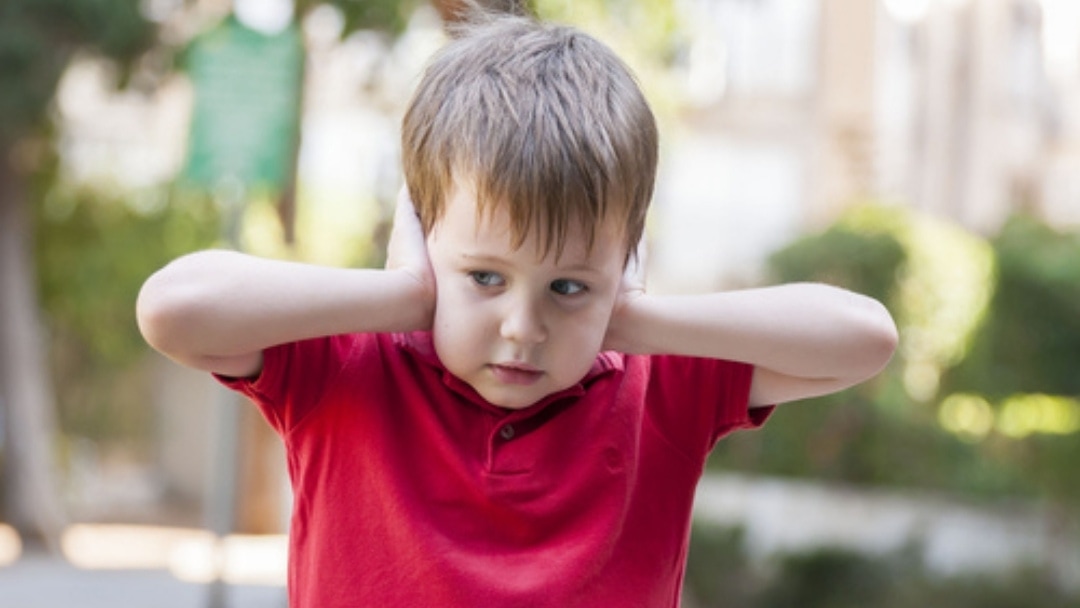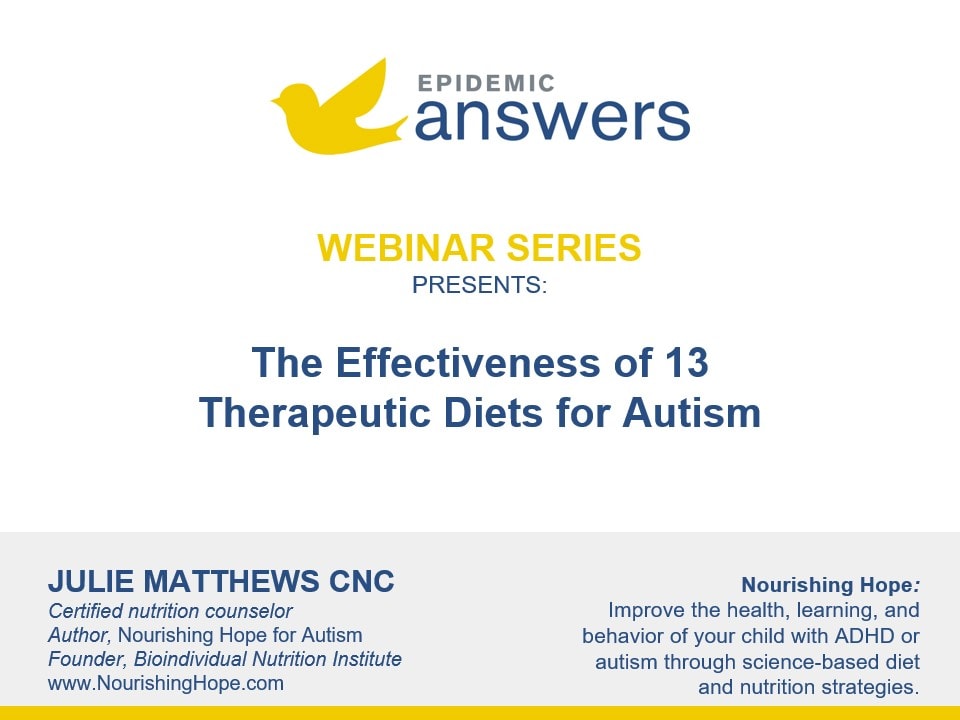Parents have been implementing special diets for years to help improve the health of and reduce symptoms in their children with autism. Given the number of cookbooks and blogs dedicated to this subject, it appears the gluten-free/casein-free (GFCF) diet was and still is the most well known diet for symptom reduction. However, there are other diets to choose from, and often, the gluten-free/casein-free diet only goes so far. How is a parent to know which diet is best for a child with autism?
Limited Research on Therapeutic Diets
Despite some parents being in the know about healing diets, peer-reviewed medical research has been decades late to the game, probably due to the fact that there is very little money to be made in this kind of study. To date, there are only a few studies about this subject, although the number is growing. The lack of research makes it harder to convince pediatricians and other physicians to recommend a therapeutic diet for their patients with autism, and parents who do have success with special diets are often dismissed as being anecdotal, one-off cases.
Jim Adams PhD of the Autism/Asperger’s Research Program at Arizona State University (ASU) has been at the forefront of studying interventions for children with autism. (We interviewed him about fecal transplants in this webinar, and you can watch the replay here.) In 2018, he and other researchers including nutritionist Julie Matthews (see our webinar interviews of her here, here and here) published the Comprehensive Nutritional and Dietary Intervention for Autism Spectrum Disorder—A Randomized, Controlled 12-Month Trial study, which showed that children with autism who ate a healthy gluten-free, casein-free, soy-free diet along with certain supplements had significantly greater improvement in autism symptoms and developmental age.
Dr. Adams was part of a team that designed a cross-sectional study, the National Survey on Treatment Effectiveness for Autism, that evaluated the effectiveness of therapeutic diets, supplements, medications, and therapies for children with autism. From this survey, Julie Matthews and Dr. Adams evaluated therapeutic diets and published their results in Ratings of the Effectiveness of 13 Therapeutic Diets for Autism Spectrum Disorder: Results of a National Survey in 2023. This study helps to answer the question: which diet is best for a child (or adult) with autism?
So Which Diet Is Best?
Before we tell you the answer, we should tell you that this study only reported the effectiveness of diets for which there were at least 20 responses. This means that some diets could be highly effective, but if there weren’t enough people participating, there’s no way to make any statistically meaningful interpretations of such limited data. Diets for which there were at least 20 responses were the following 13 diets:
- Ketogenic diet
- Corn-free diet
- Casein-free diet
- Paleo diet
- Soy-free diet
- Gluten-free diet
The Best Diet in Terms of Overall Benefit
The survey results also included diets such as the GAPS (Gut and Psychology Syndrome) diet and the low-oxalate diet, but there were not enough responses to include them in study evaluation. In addition, the Body Ecology Diet, the low-histamine diet and the low-glutamate diet – a newcomer on the scene (see our webinar interview of its developer Katie Reid PhD here), was not analyzed.
So which diet is best, overall? On a scale of 0-4 (0 = no benefit, 4 = great benefit), the answer is a healthy diet, which is defined as “a diet high in the intake of vegetables, fruit, and protein and low in junk food”. This diet had the highest net benefit (2.7) with no adverse effects. The diets with the next-best overall benefits were the Feingold diet (2.6), the food-avoidance (IgG/IgE) diet (2.6), the low-sugar diet (2.4), and the GFCF diet (2.3). However, all of the diets evaluated in the study showed significant benefit to a person with autism.
The answer to a lesser extent is: The diet that you can get your child to follow with compliance. “Positive correlations were found between how strictly diets were followed and the Overall Benefit users received from the diet.”
The Best Diet in Terms of Symptom Reduction
In terms of symptom reduction, however, the best diets were the “ketogenic diet, GFCF diet, Feingold diet, food avoidance diet based on observation, and a low sugar diet.” Because there can be some mild adverse effects associated with some of these diets, their net benefit ranked lower than a plain, old healthy diet. All of the diets evaluated in the study showed significant benefit to a person with autism.
The study showed that therapeutic diets can improve symptoms of (ranked in descending order of benefit):
- Attention
- Cognition
- Health
- Hyperactivity
- Irritability
- Aggression/agitation
- Anxiety
- Constipation
- Diarrhea
- Language/communication
- Eczema/skin problems
- Stimming/perseveration/desire for sameness
- Sensory sensitivity
- Social interaction
- Understanding
When it comes to choosing the best diet for symptom reduction, it really depends which symptoms are the most pressing. For example, if your child has hyperactivity, irritability or aggression, the Feingold diet would be a good choice. Or if your child has stimming issues, the GFCF would be a logical choice.
The ketogenic diet had the highest benefit for nine symptoms: “attention (43%), cognition (37%), anxiety (33%), language/communication (29%), social interaction and understanding (29%), constipation (24%), seizures (19%), lethargy (19%), and depression (14%).” However, fewer people were following this diet, and it had the highest adverse effect (0.4) in this study. We recommend working with a knowledgeable nutritionist or doctor because it is an extreme diet.
What Happens If Symptoms Don’t Improve?
Because this study suggests that therapeutic diets are generally safe and fairly effective, it would be unusual that no symptoms improve when following any of these diets. If a diet has been followed strictly for several months and symptoms have improved but there are still remaining symptoms, we recommend looking into adding in an additional diet because there may be greater benefits when done in combination.
For example, a parent may start their child on a healthy diet and some symptoms such as constipation improved, which is a great start in improving health. However, other symptoms remain, such as hyperactivity, so the Feingold diet could be layered onto the healthy diet, and the parent removes foods containing artificial colors and flavors, preservatives, and foods with high levels of phenols and salicylates. From there, a GFCF diet could be further added in to help with attention, focus and sensory issues.
As a parent gets more well-versed in special diets and playing what Kelly Dorfman refers to as a “nutrition detective”, an elimination diet, a grain-free diet (such as the GAPS, SCD, Body Ecology Diet or paleo diet) or other special diet such as a low-glutamate, low-histamine or low-oxalate diet could be added in. Because everyone is different, different diets will have different effects, and a personalized approach works best, which is why we recommend keeping a food diary to keep track of foods eaten and any symptoms that improve or worsen over the next two to three days.
About Maria Rickert Hong CHHC
Maria Rickert Hong is a Co-Founder of, and the Education and Media Director for, Epidemic Answers, the 501(c)3 sponsoring non-profit of The Documenting Hope Project.
She is a former sell-side Wall Street equity research analyst who covered the oil services sector at Salomon Smith Barney and Lehman Brothers under Institutional Investor #1 ranked analysts. Later, she covered the gaming, lodging & leisure sector at Jefferies & Co. and Calyon Securities. She quit working on Wall Street when her first son was born.

Prior to working on Wall Street, she was a marketing specialist for Halliburton in New Orleans, where she also received her MBA in Finance & Strategy from Tulane University.
She is the author of the bestselling book Almost Autism: Recovering Children from Sensory Processing Disorder and the co-author of Brain Under Attack: A Resource for Parents and Caregivers of Children with PANS, PANDAS, and Autoimmune Encephalitis. Maria is also a Certified Holistic Health Counselor. Her work can be found on EpidemicAnswers.org, DocumentingHope.com, Healing.DocumentingHope.com, Conference.DocumentingHope.com and MariaRickertHong.com
Still Looking for Answers?
Visit the Epidemic Answers Practitioner Directory to find a practitioner near you.
Join us inside our online membership community for parents, Healing Together, where you’ll find even more healing resources, expert guidance, and a community to support you every step of your child’s healing journey.
Sources & References
Ābele, S., et al. Specific Carbohydrate Diet (SCD/GAPS) and Dietary Supplements for Children with Autistic Spectrum Disorder. Proc. Latv. Acad. Sci. 2021;75:417–425.
Adams, J.B., et al. Comprehensive Nutritional and Dietary Intervention for Autism Spectrum Disorder-A Randomized, Controlled 12-Month Trial. Nutrients. 2018 Mar 17;10(3).
Adams, J.B., et al. Effect of a vitamin/mineral supplement on children and adults with autism. BMC Pediatr. 2011;11:111.
Adams, J.B., et al. Gastrointestinal Flora and Gastrointestinal Status in Children with Autism—Comparisons to Typical Children and Correlation with Autism Severity. BMC Gastroenterol. 2011;11:22.
Adams, J.B., et al. Nutritional and metabolic status of children with autism vs. neurotypical children, and the association with autism severity. Nutr Metab (Lond). 2011 Jun 8;8(1):34.
Adams, J.B., et al. Vitamin/mineral/micronutrient supplement for autism spectrum disorders: a research survey. BMC Pediatr. 2022 Oct 13;22(1):590.
Alberti, A., et al. Sulphation Deficit in “Low-Functioning” Autistic Children: A Pilot Study. Biol. Psychiatry. 1999;46:420–424.
Ashraghi, R.S., et al. Early Disruption of the Microbiome Leading to Decreased Antioxidant Capacity and Epigenetic Changes: Implications for the Rise in Autism. Front. Cell. Neurosci., 15 Aug 2018.
Barnhill, K., et al. Brief Report: Implementation of a Specific Carbohydrate Diet for a Child with Autism Spectrum Disorder and Fragile X Syndrome. J. Autism Dev. Disord. 2020;50:1800–1808.
Berding, K., et al. Diet Can Impact Microbiota Composition in Children With Autism Spectrum Disorder. Front. Neurosci. 2018;12:515.
Bjørklund, G., et al. Gastrointestinal alterations in autism spectrum disorder: What do we know? Neurosci Biobehav Rev. 2020 Nov:118:111-120.
Blaylock, R.L. A possible central mechanism in autism spectrum disorders, part 3: the role of excitotoxin food additives and the synergistic effects of other environmental toxins. Altern Ther Health Med. 2009 Mar-Apr;15(2):56-60.
Blaylock, R.L., et al. Immune-glutamatergic dysfunction as a central mechanism of the autism spectrum disorders. Curr Med Chem. 2009;16(2):157-70.
Bourre, J.M. Effects of nutrients (in food) on the structure and function of the nervous system: update on dietary requirements for brain. Part 1: micronutrients. J Nutr Health Aging. 2006 Sep-Oct;10(5):377-85.
Bourre, J.M. Effects of nutrients (in food) on the structure and function of the nervous system: update on dietary requirements for brain. Part 2 : macronutrients. J Nutr Health Aging. 2006 Sep-Oct;10(5):386-99.
Buie, T., et al. Evaluation, diagnosis, and treatment of gastrointestinal disorders in individuals with ASDs: a consensus report. Pediatrics. 2010 Jan;125 Suppl 1:S1-18.
Buie, T., et al. Recommendations for evaluation and treatment of common gastrointestinal problems in children with ASDs. Pediatrics. 2010 Jan;125 Suppl 1:S19-29.
Cekici, H., et al. Current Nutritional Approaches in Managing Autism Spectrum Disorder: A Review. Nutr. Neurosci. 2019;22:145–155.
Chistol, L.T., et al. Sensory Sensitivity and Food Selectivity in Children with Autism Spectrum Disorder. J. Autism Dev. Disord. 2018;48:583–591.
De Magistris, et al. Alterations of the intestinal barrier in patients with autism spectrum disorders and in their first-degree relatives. J Pediatr Gastroenterol Nutr. 2010;51(4):418-24.
De Magistris. L., et al. Antibodies against Food Antigens in Patients with Autistic Spectrum Disorders. BioMed Res. Int. 2013;2013:729349.
Doreswamy, S., et al. Effects of Diet, Nutrition, and Exercise in Children With Autism and Autism Spectrum Disorder: A Literature Review. Cureus. 2020;12:e12222.
Dyńka, D., et al. The Role of Ketogenic Diet in the Treatment of Neurological Diseases. Nutrients. 2022 Nov 24;14(23):5003.
El-Ansary, A. GABA and Glutamate Imbalance in Autism and Their Reversal as Novel Hypothesis for Effective Treatment Strategy. Autism and Developmental Disorders. 18, no. 3 (2020): 46-63.
El-Rashidy, O., et al. Ketogenic Diet versus Gluten Free Casein Free Diet in Autistic Children: A Case-Control Study. Metab. Brain Dis. 2017;32:1935–1941.
Erickson, C.A., et al. Gastrointestinal Factors in Autistic Disorder: A Critical Review. Journal of Autism and Developmental Disorders. 2005 Dec;35(6):713-27.
Fattorusso, A., et al. Autism Spectrum Disorders and the Gut Microbiota. Nutrients. 2019 Feb 28;11(3):521.
Feingold, B.F. Hyperkinesis and Learning Disabilities Linked to Artificial Food Flavors and Colors. Am. J. Nurs. 1975;75:797–803.
Ghalichi, F., et al. Effect of Gluten Free Diet on Gastrointestinal and Behavioral Indices for Children with Autism Spectrum Disorders: A Randomized Clinical Trial. World J. Pediatr. 2016;12:436–442.
Ghanizadeh, A. Increased glutamate and homocysteine and decreased glutamine levels in autism: a review and strategies for future studies of amino acids in autism. Dis Markers. 2013;35(5):281-6
Gough, S., et al. Neuroprotection by the Ketogenic Diet: Evidence and Controversies. Front Nutr. 2021 Nov 23:8:782657.
Grimaldi, R., et al. A prebiotic intervention study in children with autism spectrum disorders (ASDs). Microbiome. 2018 Aug 2;6(1):133.
Hadjivassiliou, M., et al. Gluten sensitivity: from gut to brain. Lancet Neurol. 2010 Mar;9(3):318-30.
Hartman, R.E., et al. Dietary Approaches to the Management of Autism Spectrum Disorders. Adv. Neurobiol. 2020;24:547–571.
Hejitz, R.D., et al. Normal gut microbiota modulates brain development and behavior. Proc Natl Acad Sci U S A. 2011 Feb 15;108(7):3047-52.
Herbert, M.R., et al. Autism and Dietary Therapy: Case Report and Review of the Literature. J. Child. Neurol. 2013;28:975–982.
Hopf, K.P., et al. Use and Perceived Effectiveness of Complementary and Alternative Medicine to Treat and Manage the Symptoms of Autism in Children: A Survey of Parents in a Community Population. J. Altern. Complement. Med. 2016;22:25–32.
Horn, J., et al. Role of Diet and Its Effects on the Gut Microbiome in the Pathophysiology of Mental Disorders. Transl. Psychiatry. 2022;12:164.
Horvath, K., et al. Autistic disorder and gastrointestinal disease. Current Opinion in Pediatrics. 2002 Oct;14(5):583-7.
Horvath, K., et al. Gastrointestinal abnormalities in children with autistic disorder. Journal of Pediatrics. 1999 Nov;135(5):559-63.
Hsu, C.-L., et al. The Effects of a Gluten and Casein-Free Diet in Children with Autism: A Case Report. Chang Gung Med. J. 2009;32:459–465.
Isaksson, J., et al. Brief Report: Association Between Autism Spectrum Disorder, Gastrointestinal Problems and Perinatal Risk Factors Within Sibling Pairs. J Autism Dev Disord. 2017 Aug;47(8):2621-2627.
Jyonouchi, H., et al. Dysregulated innate immune responses in young children with autism spectrum disorders: their relationship to gastrointestinal symptoms and dietary intervention. Neuropsychobiology. 2005;51(2):77-85.
Jyonouchi, H., et al. Evaluation of an Association between Gastrointestinal Symptoms and Cytokine Production against Common Dietary Proteins in Children with Autism Spectrum Disorders. J. Pediatr. 2005;146:605–610.
Jyonouchi, H., et al. Innate Immunity Associated with Inflammatory Responses and Cytokine Production against Common Dietary Proteins in Patients with Autism Spectrum Disorder. Neuropsychobiology. 2002;46:76–84.
Kałużna-Czaplińska, J., et al. Nutritional Strategies and Personalized Diet in Autism-Choice or Necessity? Trends Food Sci. Technol. 2016;49:45–50.
Karagözlü, S., et al. The Relationship of Severity of Autism with Gastrointestinal Symptoms and Serum Zonulin Levels in Autistic Children. J. Autism Dev. Disord. 2022;52:623–629.
Karhu, E., et al. Nutritional interventions for autism spectrum disorder. Nutr Rev. 2020 Jul 1;78(7):515-531.
Kawicka, A., et al. How Nutritional Status, Diet and Dietary Supplements Can Affect Autism. A Review. Rocz. Panstw. Zakl. Hig. 2013;64:1–12.
Knivsberg, A.M., et al. A Randomised, Controlled Study of Dietary Intervention in Autistic Syndromes. Nutr. Neurosci. 2002;5:251–261.
Konstantynowicz, J., et al. A Potential Pathogenic Role of Oxalate in Autism. Eur. J. Paediatr. Neurol. 2012;16:485–491.
Kushak, R.I., et al. Intestinal Disaccharidase Activity in Patients with Autism: Effect of Age, Gender, and Intestinal Inflammation. Autism. 2011;15:285–294.
Lai, C.C.W., et al. The association between gut-health promoting diet and depression: A mediation analysis. J Affect Disord. 2023 Mar 1:324:136-142.
Lee, R.W.Y., et al. A modified ketogenic gluten-free diet with MCT improves behavior in children with autism spectrum disorder. Physiol Behav. 2018 May 1:188:205-211.
Li, C., et al. Study on Aberrant Eating Behaviors, Food Intolerance, and Stereotyped Behaviors in Autism Spectrum Disorder. Front. Psychiatry. 2020;11:493695.
Li, Q., et al. A Ketogenic Diet and the Treatment of Autism Spectrum Disorder. Front Pediatr. 2021 May 11:9:650624.
Lionetti, E., et al. Gluten Psychosis: Confirmation of a New Clinical Entity. Nutrients. 2015 Jul 8;7(7):5532-9.
Lucarelli, S., et al. Food Allergy and Infantile Autism. Panminerva Med. 1995;37:137–141.
Madra, M., et al. Gastrointestinal Issues and Autism Spectrum Disorder. Psychiatr Clin North Am. 2021 Mar; 44(1): 69–81.
Mandecka, A., et al. The importance of nutritional management and education in the treatment of autism. Rocz. Panstw. Zakl. Hig. 2022;73:247–258. [
Marí-Bauset, S., et al. Nutritional Impact of a Gluten-Free Casein-Free Diet in Children with Autism Spectrum Disorder. J. Autism Dev. Disord. 2016;46:673–684.
Matthews, J.S., et al. Ratings of the Effectiveness of 13 Therapeutic Diets for Autism Spectrum Disorder: Results of a National Survey. J Pers Med. 2023 Sep 29;13(10):1448.
McCann, D., et al. Food Additives and Hyperactive Behaviour in 3-Year-Old and 8/9-Year-Old Children in the Community: A Randomised, Double-Blinded, Placebo-Controlled Trial. Lancet. 2007;370:1560–1567.
Mesleh, A.G., et al. Paving the Way toward Personalized Medicine: Current Advances and Challenges in Multi-OMICS Approach in Autism Spectrum Disorder for Biomarkers Discovery and Patient Stratification. J. Pers. Med. 2021;11:41.
Molina-López, J., et al. Food Selectivity, Nutritional Inadequacies, and Mealtime Behavioral Problems in Children with Autism Spectrum Disorder Compared to Neurotypical Children. Int. J. Eat. Disord. 2021;54:2155–2166.
Mu, C., et al. Metabolic Framework for the Improvement of Autism Spectrum Disorders by a Modified Ketogenic Diet: A Pilot Study. J Proteome Res. 2020 Jan 3;19(1):382-390.
Nemecheck, P., et al. Autism Spectrum Disorder Symptoms Improve with Combination Therapy Directed at Improving Gut Microbiota and Reducing Inflammation. Applied Psychiatry. 2020 Jul; (1)1.
O’Hara, N.H., et al. The recovery of a child with autism spectrum disorder through biomedical interventions. Altern Ther Health Med. 2008 Nov-Dec;14(6):42-4.
Olivito, I., et al. Ketogenic diet ameliorates autism spectrum disorders-like behaviors via reduced inflammatory factors and microbiota remodeling in BTBR T+ Itpr3tf/J mice. Exp Neurol. 2023 Aug:366:114432.
Pelsser, L.M., et al. Effects of a restricted elimination diet on the behaviour of children with attention-deficit hyperactivity disorder (INCA study): a randomised controlled trial. Lancet. 2011 Feb 5;377(9764):494-503.
Pietrzak, D., et al. The Therapeutic Role of Ketogenic Diet in Neurological Disorders. Nutrients. 2022 May 6;14(9):1952.
Piwowarczyk, A., et al. Gluten-Free Diet in Children with Autism Spectrum Disorders: A Randomized, Controlled, Single-Blinded Trial. J. Autism Dev. Disord. 2020;50:482–490.
Quan, L., et al. A Systematic Review and Meta-Analysis of the Benefits of a Gluten-Free Diet and/or Casein-Free Diet for Children with Autism Spectrum Disorder. Nutr. Rev. 2022;80:1237–1246.
Qureshi, F., et al. Multivariate Analysis of Metabolomic and Nutritional Profiles among Children with Autism Spectrum Disorder. J. Pers. Med. 2022;12:923.
Rimland, B., et al. Parent Ratings of Behavioral Effects of Biomedical Interventions. Autism Research Institute Newsletter. Volume 34 ARI Publication; San Diego, CA, USA: 2009.
Ristori, M.V., et al. Autism, Gastrointestinal Symptoms and Modulation of Gut Microbiota by Nutritional Interventions. Nutrients. 2019;11:2812.
Smith, J., et al. Ketogenic diet restores aberrant cortical motor maps and excitation-to-inhibition imbalance in the BTBR mouse model of autism spectrum disorder. Behav Brain Res. 2016 May 1:304:67-70.
Stafstrom, C.E., et al. The ketogenic diet as a treatment paradigm for diverse neurological disorders. Front Pharmacol. 2012 Apr 9:3:59.
Swann., O.G., et al. Dietary fiber and its associations with depression and inflammation. Nutr Rev. 2020 May 1;78(5):394-411.
Tan S., et al. The Association between Sugar-Sweetened Beverages and Milk Intake with Emotional and Behavioral Problems in Children with Autism Spectrum Disorder. Front. Nutr. 2022;9:927212.
Theoharides, T.C. Is a subtype of autism an allergy of the brain? Clin Ther. 2013; 35(5):584-91.
Tomova, A., et al. The Influence of Food Intake Specificity in Children with Autism on Gut Microbiota. Int. J. Mol. Sci. 2020;21:2797.
Vargas, D.D., et al. Effectiveness of nutritional interventions on behavioral symptomatology of autism spectrum disorder: a systematic review. Nutr Hosp. 2022 Dec 20;39(6):1378-1388.
Verena, L., et al. Elimination diets’ efficacy and mechanisms in attention deficit hyperactivity disorder and autism spectrum disorder. Eur Child Adolesc Psychiatry. 2017; 26(9): 1067–1079.
Vita, A.A., et al. Associations between Food-Specific IgG Antibodies and Intestinal Permeability Biomarkers. Front. Nutr. 2022;9:962093.
Vojdani, A., et al. A Gut Feeling for Immune Dysregulation & Neuroinflammation in Autism. The Autism File. 2009(31).
Wang, J., et al. Global Prevalence of Autism Spectrum Disorder and Its Gastrointestinal Symptoms: A Systematic Review and Meta-Analysis. Front. Psychiatry. 2022;13:963102.
Wang, L., et al. Gastrointestinal microbiota and metabolite biomarkers in children with autism spectrum disorders. Biomark Med. 2014;8(3):331-44.
Wang, X., et al. Association between Dietary Quality and Executive Functions in School-Aged Children with Autism Spectrum Disorder. Front. Nutr. 2022;9:940246.
Warner, B.B. The contribution of the gut microbiome to neurodevelopment and neuropsychiatric disorders. Pediatr Res. 2019 Jan;85(2):216-224.
Wasilewska, J., et al. Gastrointestinal symptoms and autism spectrum disorder: links and risks – a possible new overlap syndrome. Pediatric Health Med Ther. 2015; 6: 153–166.
Westmark, C.J. Soy Infant Formula and Seizures in Children with Autism: A Retrospective Study. PLoS ONE. 2014;9:e80488.
Whiteley, P., et al. The ScanBrit Randomised, Controlled, Single-Blind Study of a Gluten- and Casein-Free Dietary Intervention for Children with Autism Spectrum Disorders. Nutr. Neurosci. 2010;13:87–100.
Williams, B.L., et al. Impaired Carbohydrate Digestion and Transport and Mucosal Dysbiosis in the Intestines of Children with Autism and Gastrointestinal Disturbances. PLoS ONE. 2011;6:e24585.
Yu, Y., et al. Efficacy and Safety of Diet Therapies in Children With Autism Spectrum Disorder: A Systematic Literature Review and Meta-Analysis. Front. Neurol. 2022;13:844117.
Resources
Articles
CBS News: ADHD Diet Study Suggests Healthy Eating May Help Kids
Chicago Tribune: Do Diet Changes Help ADHD Children?
The Feingold Diet: Our Family’s Experience with a Dye-Free Diet
Julie Matthew’s BioIndividual Nutrition recipes
Julie Matthew’s BioIndividual Nutrition Feingold Diet / Failsafe Diet
Our Journey with the Feingold Diet
Books
Adams, Mike. The Truth About Aspartame, MSG and Excitoxins. Truth Publishing, Inc., 2010.
Ballantyne, Sarah. Paleo Approach: Reverse Autoimmune Disease Heal Your Body. Victory Belt Publishing, 2014.
Blaylock, Russell L. Excitotoxins: The Taste That Kills. Health Press, 1996.
Bock, Kenneth. Healing the New Childhood Epidemics: Autism, ADHD, Asthma, and Allergies: The Groundbreaking Program for the 4-A Disorders. New York, NY. Ballantine Books, 2008.
Campbell-McBride, Natasha. Gut and Psychology Syndrome: Natural Treatment for Autism, Dyspraxia, A.D.D., Dyslexia, A.D.H.D., Depression, Schizophrenia, 2010.
Cordain, Loren. The Paleo Diet Revised: Lose Weight and Get Healthy by Eating the Foods You Were Designed to Eat. Harvest, 2010.
Davis, Sheri. All Natural Mom’s Guide to the Feingold Diet: A Natural Approach to ADHD and Other Related Disorders. Sheri Davis, 2014.
Ernsperger, Lori, et al. Just Take a Bite: Easy, Effective Answers to Food Aversions and Eating Challenges! Future Horizons, 2004.
Feingold, Ben. The Feingold Cookbook for Hyperactive Children, and Others Associated with Food Additives and Salicylates. Random House, 1979.
Feingold, Ben. Why Your Child Is Hyperactive: The Bestselling Book on How ADHD Is Caused by Artificial Food Flavors and Colors. Random House, 1985.
Galland, Leo. The Effect of Intestinal Microbes on Systemic Immunity. Excerpted from Power Healing. Random House, 1998.
Giustra-Kozek, Jennifer. Healing without hurting: treating ADHD, apraxia, and autism spectrum disorders naturally and effectively without harmful medication. Howard Beach, NY: Changing Lives Press, 2014.
Herbert, Martha, Weintraub Karen. The Autism Revolution: Whole-Body Strategies for Making Life All It Can Be. New York: Ballantine Books; 2012.
Hersey, Jane. Why Can’t My Child Behave?: Why Can’t She Cope? Why Can’t He Learn? The Feingold Diet Updated for Today’s Busy Families. Pear Tree Press, 2014.
Hong, Maria Rickert. Almost Autism: Recovering Children from Sensory Processing Disorder, A Reference for Parents and Practitioners. 2014.
Lambert, Beth. A Compromised Generation: The Epidemic of Chronic Illness in America’s Children. Sentient Publications, 2010.
Lemer, Patricia S. Outsmarting Autism: The Ultimate Guide to Management, Healing and Prevention for Individuals with Autism Spectrum Disorders. Tarentum, PA, Word Association Publishers, 2014.
Matthews, Julie. Nourishing Hope for Autism: Nutrition and Diet Guide for Healing Our Children. Healthful Living Media, 2008.
Scott, Trudy. The Antianxiety Food Solution: How the Foods You Eat Can Help You Calm Your Anxious Mind, Improve Your Mood and End Cravings. New Harbinger Publications, 2011.
Seroussi, Karyn. Unraveling the Mystery of Autism and Pervasive Developmental Disorder: A Mother’s Story of Research and Recovery. New York: Simon & Schuster, 2000.
Sisson, Mark. The Primal Blueprint: Reprogram Your Genes for Effortless Weight Loss, Vibrant Health, and Boundless Energy. Primal Nutrition, Inc., 2019.
Tam, Michelle, et al. Nom Nom Paleo: Food for Humans (Volume 1). Andrews McMeel Publishing, 2013.
Voegtlin, Walter. The Stone Age Diet: Based on In-depth Studies of Human Ecology and the Diet of Man. Vantage Press, 1975.
Wahls, Terry. The Wahls Protocol: A Radical New Way to Treat All Chronic Autoimmune Conditions Using Paleo Principles. Avery, 2020.
Wahls, Terry. The Wahls Protocol Cooking for Life: The Revolutionary Modern Paleo Plan to Treat All Chronic Autoimmune Conditions. Avery, 2017.
Websites
Amy Yasko’s list of foods with high free glutamates
Katie Reid’s pantry list of recommended foods.
Unblind My Mind: Dr. Katie Reid’s website gives extensive explanation about the science, a TED talk by Dr. Reid and video tutorials to help parent’s discern appropriate foods in a local supermarket.
Videos
Excitotoxins, Neurotoxins & Human Neurological Disease Lecture by Russell Blaylock MD
Glutamate, Excitoxicity and Autism
Minding your mitochondria | Dr. Terry Wahls | TEDxIowaCity
Unblind My Mind: What Are We Eating? Dr. Katherine Reid at TEDxYouth@GrassValley




